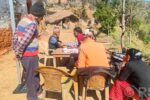DOTI: In a move to introduce sustainable and scientific methods to commercialize Nepal’s specialty coffee, local farmers in Shikhar Municipality, Doti district, Sudurpaschim Province, are undergoing training.
The program is a joint effort by the European Union Trade and Investment Program under the Ministry of Industry, Commerce and Supplies (MoICS), the National Tea and Coffee Development Board, and Shikhar Municipality.
The training, initiated on Friday, involves practical learning experiences, providing farmers with insights into modern techniques of coffee nursery development and plantation.
The sessions aim to familiarize potential coffee farmers with basic techniques of coffee farming and processing.
Recognizing the significant potential for coffee cultivation in the district, a two-day hands-on training program commenced on Friday, introducing farmers to the scientific methods integral to coffee farming and processing.
The event included the planting of 120 Arabica coffee saplings, serving as a tangible demonstration of contemporary approaches to coffee cultivation.
A total of 30 farmers, including 15 women, are participating in this pioneering initiative to sensitize local stakeholders.
The training is expected to promote scientific, sustainable, and commercially viable coffee production at the local level, fostering effective coordination with local governments and relevant stakeholders.
As the nation transitions into a federal system, these collaborative efforts are anticipated to bring substantial benefits to farmers and entrepreneurs engaged in coffee cultivation, strengthening their participation in the coffee value chain.
Bishnu Bhat, a female participant from Shikhar Municipality in Doti, expressed excitement about the prospects offered by this capacity-building initiative and outlined her desire to expand her coffee farming pursuits by applying the newfound knowledge gained from the training.
Sunita Rawal, Deputy Mayor of Shikhar Municipality, underscored the importance of collaboration among all state institutions and the private sector to achieve sustainable coffee production and enhanced productivity. Rawal emphasized the need to ensure markets for locally produced coffee to inspire farmers to expand coffee plantations through more investment.
Stating that Nepali coffee enjoys impressive demand in domestic and international markets, Bhakta Raj Joshi, Under Secretary of MoICS, Min Hamal, Senior Program Manager of the European Union Delegation office, and Dr. Badri Prasad Bastakoti, an expert from the EU-Nepal Trade and Investment Program, along with leading farmer Amar Bahadur Shahi, stressed the necessity of expanding modern and sustainable farming techniques to strengthen supply capacity.
In the fiscal year 2022/23, Nepal exported 77 tons and imported 450 tons of coffee. Nepal holds the potential for coffee farming in around 1.2 million hectares.
According to the National Tea and Coffee Development Board, coffee plantations across the country have covered over 3655 hectares, producing around 400 tons during the review year.
RSS









Comment